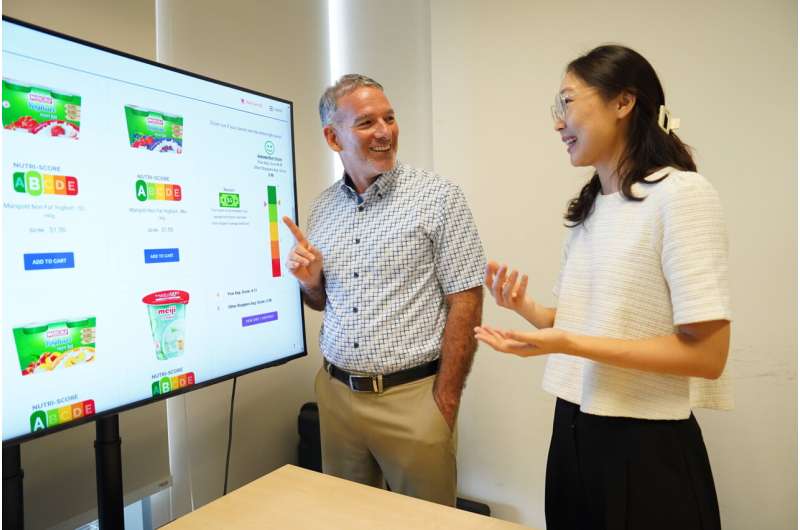This article has been reviewed according to Science X's editorial process and policies. Editors have highlighted the following attributes while ensuring the content's credibility:
fact-checked
trusted source
proofread
Study reveals peer influence can promote healthier shopping habits

Amid the rise of chronic diseases, such as heart disease and diabetes, a novel study by Duke-NUS Medical School offers a fresh perspective on encouraging healthier grocery shopping. Despite the widespread use of color-coded front-of-pack nutrition labels aimed to help consumers make healthier choices, these measures have not been sufficient to stem the rising tide of chronic diseases.
To determine if adding behavioral nudges and financial incentives could improve diet quality, researchers from Duke-NUS' Health Services and Systems Research Program conducted a randomized trial using an experimental online grocery store called NUSMart.
During the study, participants were asked to complete three online shops and spend roughly S$60. Each time they visited the online store, they randomly encountered one of three versions of NUSMart:
- A control store where packaged food was displayed without any front-of-pack nutritional label;
- A version where consumers could view the nutritional value of each product via a color-coded front-of-pack label. They also saw a color-coded barometer that compared the quality of their shopping basket to that of their peers (peer influence); and
- A version with the front-of-pack label, peer influence and the option to earn a S$5 cash incentive so long as their shopping basket was healthier than their peers' at checkout.
Summing up the findings, which were published in the journal Food Policy in May, first author and Assistant Professor Soye Shin, from Duke-NUS Health Services and Systems Research Program, said, "We found that when our shoppers were exposed to the front-of-pack labels and peer influence, there was a large improvement in the healthiness of the shopping basket. There was an additional improvement in the 'yours-to-lose' cash reward arm, but the biggest bang came from the peer influence."
Boosting nutritional labeling's impact
For their study, the Duke-NUS team applied the Nutri-Score labeling system used in several European countries to provide consumers with nutritional information. This system assigns products a letter grade, ranging from A (healthiest, green) to E (unhealthiest, red) based on their overall nutrient quality, including factors such as sugar, sodium, saturated fat and calories per serving.
Based on a product's letter grade, the team assigned a point score, ranging from 5 points for A to 1 point for E to calculate the healthiness of the grocery basket. The higher the score, the healthier the basket.
When the researchers allowed participants to see the front-of-pack labels and how their shopping basket compared to that of their peers, there was a 14% improvement in the diet quality of the shopping basket relative to the control condition.
Adding the cash incentive, which they presented in a "loss-frame" format (i.e., the reward was "yours to lose"), the improvement in diet quality was only an additional 5.6%. The combined effect of the interventions was akin to moving average nutritional quality from a low C grade to a low B grade.
Even without the incentive, the effects are large enough to generate health improvements. The front-of-pack labels plus peer influence reduced sugar purchases by an average of 8.9 grams per serving.
According to a survey by the Singapore Health Promotion Board (HPB) in 2022, Singaporeans consume on average 6 grams of sugar, more than the maximum recommended daily sugar intake. Reducing their sugar consumption by 8.9 grams per serving could have a significant impact on the nation's ongoing war on diabetes, the researchers added.
They observed a similar impact on sodium, with consumers opting for groceries that had on average 3.7 grams less per serving. Such a reduction could help the nine in 10 Singaporeans who, according to HPB, consume 3.6 grams of sodium per day, well above the maximum daily recommended sodium intake of 2.0 grams.
Senior author Professor Eric Finkelstein, from Duke-NUS Health Services and Systems Research Program, said, "We've seen peer influence be effective at reducing energy consumption. With this study, we've demonstrated that it can also motivate consumers to select more nutritional items. This is a simple and costless way to fight chronic diseases. I hope our findings encourage supermarkets to introduce these interventions into their online shopping environment."
Commenting on the potential impact of the team's work, Professor Patrick Tan, Senior Vice-Dean for Research at Duke-NUS, said, "These findings are very timely. The COVID pandemic has had a profound impact on grocery shopping habits, with more consumers turning to online stores.
"This in turn has created a unique opportunity to implement novel solutions to help consumers improve their diet, which is a cornerstone in our fight against non-communicable diseases, like diabetes and cardiovascular diseases."
More information: Soye Shin et al, Influencing the nutritional quality of grocery purchases: A randomized trial to evaluate the impact of a social norm-based behavioral intervention with and without a loss-framed financial incentive, Food Policy (2024). DOI: 10.1016/j.foodpol.2024.102646



















